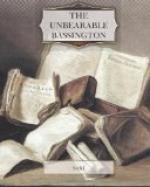Francesca’s conviction that things had gone wrong between Comus and Elaine de Frey grew in strength as the day wore on. She lunched at a friend’s house, but it was not a quarter where special social information of any importance was likely to come early to hand. Instead of the news she was hankering for, she had to listen to trivial gossip and speculation on the flirtations and “cases” and “affairs” of a string of acquaintances whose matrimonial projects interested her about as much as the nesting arrangements of the wildfowl in St. James’s Park.
“Of course,” said her hostess, with the duly impressive emphasis of a privileged chronicler, “we’ve always regarded Claire as the marrying one of the family, so when Emily came to us and said, ‘I’ve got some news for you,’ we all said, ‘Claire’s engaged!’ ‘Oh, no,’ said Emily, ‘it’s not Claire this time, it’s me.’ So then we had to guess who the lucky man was. ’It can’t be Captain Parminter,’ we all said, ‘because he’s always been sweet on Joan.’ And then Emily said—”
The recording voice reeled off the catalogue of inane remarks with a comfortable purring complacency that held out no hope of an early abandoning of the topic. Francesca sat and wondered why the innocent acceptance of a cutlet and a glass of indifferent claret should lay one open to such unsparing punishment.
A stroll homeward through the Park after lunch brought no further enlightenment on the subject that was uppermost in her mind; what was worse, it brought her, without possibility of escape, within hailing distance of Merla Blathington, who fastened on to her with the enthusiasm of a lonely tsetse fly encountering an outpost of civilisation.
“Just think,” she buzzed inconsequently, “my sister in Cambridgeshire has hatched out thirty-three White Orpington chickens in her incubator!”
“What eggs did she put in it?” asked Francesca.
“Oh, some very special strain of White Orpington.”
“Then I don’t see anything remarkable in the result. If she had put in crocodile’s eggs and hatched out White Orpingtons, there might have been something to write to Country Life about.”
“What funny fascinating things these little green park-chairs are,” said Merla, starting off on a fresh topic; “they always look so quaint and knowing when they’re stuck away in pairs by themselves under the trees, as if they were having a heart-to-heart talk or discussing a piece of very private scandal. If they could only speak, what tragedies and comedies they could tell us of, what flirtations and proposals.”
“Let us be devoutly thankful that they can’t,” said Francesca, with a shuddering recollection of the luncheon-table conversation.
“Of course, it would make one very careful what one said before them—or above them rather,” Merla rattled on, and then, to Francesca’s infinite relief, she espied another acquaintance sitting in unprotected solitude, who promised to supply a more durable audience than her present rapidly moving companion. Francesca was free to return to her drawing-room in Blue Street to await with such patience as she could command the coming of some visitor who might be able to throw light on the subject that was puzzling and disquieting her. The arrival of George St. Michael boded bad news, but at any rate news, and she gave him an almost cordial welcome.




